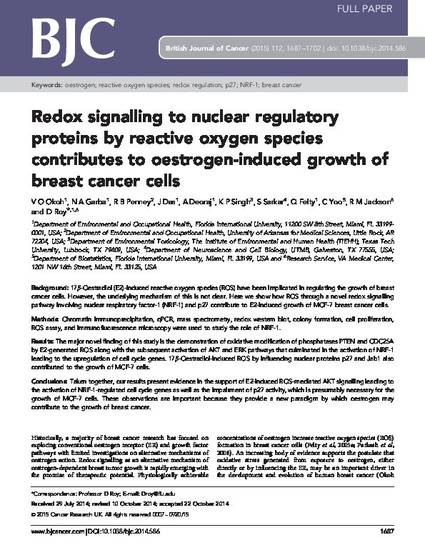
Background:
17β-Oestradiol (E2)-induced reactive oxygen species (ROS) have been implicated in regulating the growth of breast cancer cells. However, the underlying mechanism of this is not clear. Here we show how ROS through a novel redox signalling pathway involving nuclear respiratory factor-1 (NRF-1) and p27 contribute to E2-induced growth of MCF-7 breast cancer cells. Methods:
Chromatin immunoprecipitation, qPCR, mass spectrometry, redox western blot, colony formation, cell proliferation, ROS assay, and immunofluorescence microscopy were used to study the role of NRF-1. Results:
The major novel finding of this study is the demonstration of oxidative modification of phosphatases PTEN and CDC25A by E2-generated ROS along with the subsequent activation of AKT and ERK pathways that culminated in the activation of NRF-1 leading to the upregulation of cell cycle genes. 17β-Oestradiol-induced ROS by influencing nuclear proteins p27 and Jab1 also contributed to the growth of MCF-7 cells. Conclusions:
Taken together, our results present evidence in the support of E2-induced ROS-mediated AKT signalling leading to the activation of NRF-1-regulated cell cycle genes as well as the impairment of p27 activity, which is presumably necessary for the growth of MCF-7 cells. These observations are important because they provide a new paradigm by which oestrogen may contribute to the growth of breast cancer.
Available at: http://works.bepress.com/jayanta-das/1/

Originally published in the British Journal of Cancer.